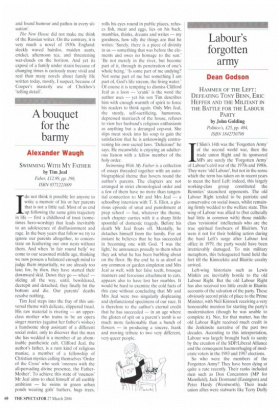A bouquet for the barmy
Alexander Waugh
SWIMMING WITH MY FATHER by Tim Jeal Faber, £12.99, pp. 198, ISBN 0571221009 Ido not think it possible for anyone to write a memoir of his or her parents that is not a little sad. Most of us end up following the same grim trajectory in life — first a childhood of trust (sometimes hero-worship) that leads inevitably to an adolescence of disillusionment and rage. In the busy years that follow we try to ignore our parents altogether, to concentrate on feathering our own nests without them. And when 'in fair round belly' we come to our seasoned middle age, thinking we now possess a balanced enough mind to judge them impartially, we are already too late; for, by then, they have started their downward skid. Down they go — whee! — sliding all the way, until, bewildered, decrepit and detached, they finally hit the bottom and die. Our parents' deaths resolve nothing.
Tim Jeal steps into the fray of this universal theme with delicate, slippered tread. His raw material is riveting — an upperclass mother who trains to be an opera singer marries (against her father's wishes) a handsome shop assistant of a different social order, only to discover that the man she has wedded is a member of an abominable pantheistic cult. Clifford Jeal, the author's father, is a rum kind of religious maniac, a member of a fellowship of Christian mystics calling themselves 'Order of the Cross' who seek 'oneness with the all-pervading divine presence, the FatherMother'. To achieve this state of 'oneness' Mr Jeal aims to shed himself of all earthly ambition — he swims in green urban ponds wearing girls' bathers, hugs trees, rolls his eyes round in public places, refuses fish, meat and eggs, lies on his back, mumbles, thinks, dreams and writes — my goodness, how silly the things are that he writes: 'Surely, there is a piece of divinity in us — something that was before the elements and owes no homage to the sun.' 'Be not merely in the river, but become part of it, through its penetration of one's whole being.' Is some part of me undying? Not some part of me but something I am part of, God's life stream, the living water.' Of course it is tempting to dismiss Clifford Jeal as a loon — 'crank' is the word the author uses — yet his son Tim describes him with enough warmth of spirit to force his readers to think again. Only Mrs Jeal, the sturdy, self-sacrificing, humorous, depressed matriarch of the house, refuses to view her husband's religious enthusiasm as anything but a deranged cop-out. She slips meat stock into his soup to gain the satisfaction that he is unknowingly contravening his own sacred laws. 'Delicious!' he says. He meanwhile is enjoying an adulterous liaison with a fellow member of the holy order.
Swimming With My Father is a collection of essays threaded together with an autobiographical theme that hovers round the author's parents. The chapters are not arranged in strict chronological order and a few of them have no more than tangential connection to Mr and Mrs Jeal — a schoolboy interview with T. S. Eliot, a glorious episode of smut and punishment at prep school — but, whatever the theme, each chapter carries with it a sharp little spoonful of domestic tragedy. Before his death Mr Jeal floats off, Mentally, he detaches himself from the family. For an instant he believes that he has succeeded in becoming one with God. 'I was the light,' he announces proudly to them when they ask what he has been burbling about on the floor. By the end he is as aloof as any common or garden simpleton and Mrs Jeal as well, with her false teeth, brusque manners and ferocious attachment to cats, appears also to have lost her marbles. It would be hard to examine the cold facts of this case without concluding that Mr and Mrs Jeal were two singularly displeasing and dysfunctional specimens of our race. It is therefore to the author's eternal credit that he has succeeded — in an age where the glisten of spit on a parent's tomb is so much more fashionable than a bunch of flowers — in producing a sincere, frank and moving tribute to two very different, very queer people.


























































































 Previous page
Previous page